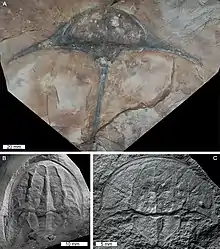Austrolimulidae
Austrolimulidae is an extinct family of horseshoe crabs belonging to the infraorder Limulina. Members of the family are known from the Permian to the beginning of the Jurassic, though one species has been reported from the end of the Cretaceous. Austrolimulids are known for amongst the most extreme morphologies among Xiphosurids, including large elongated genal spines. Unlike living Limulids, Austrolimulids were likely adapted for freshwater and brackish environments.[1] They are considered to be the sister group to Limulidae, the group that contains all modern horseshoe crabs.[2]
| Austrolimulidae Temporal range: | |
|---|---|
 | |
| Fossils of Austrolimulus (top), Tasmaniolimulus (left), and Dubbolimulus (right) | |
| Scientific classification | |
| Domain: | Eukaryota |
| Kingdom: | Animalia |
| Phylum: | Arthropoda |
| Subphylum: | Chelicerata |
| Order: | Xiphosura |
| Superfamily: | Limuloidea |
| Family: | †Austrolimulidae Riek, 1955 |
Genera
- †Austrolimulus Riek, 1955 Triassic, Beacon Hill Shale, NSW, Australia
- †Attenborolimulus Bicknell, 2021 Triassic (Olenekian), Petropavlovka Formation, Cis-Urals, Russia[3]
- †Batracholimulus Wilde, 1987 Triassic (Rhaetian), Exter Formation, Germany
- †Boeotiaspis Lamsdell, 2020 Carboniferous, United States (Jr. synonym)[2]
- †Casterolimulus Holland, Erickson & O'Brien, 1975 Late Cretaceous (Maastrichtian) Fox Hills Formation, North Dakota, USA (Inconsistently placed in this family)
- †Dubbolimulus Pickett 1984 Middle Triassic (Anisian) Napperby Formation, Australia
- †Franconiolimulus Bicknell, Hecker & Heyng, 2021[4] Early Jurassic (Hettangian) Bayreuth Formation, Germany
- †Limulitella Schimper 1853 Middle Triassic (Anisian), Grés á Voltzia Formation, France
- †Panduralimulus Allen and Feldmann 2005 Early Permian (Kungurian), Lueders Formation, Texas, USA
- †Psammolimulus Lange 1923 Early-Middle Triassic, Solling Formation, Germany
- †Tasmaniolimulus Bicknell, 2019[5] Early Triassic,[6] Jackey Shale, Tasmania, Australia
- †Vaderlimulus Lerner, Lucas and Lockley, 2017[7] Early Triassic (Olenekian) Thaynes Group, Idaho, USA
References
- Bicknell, Russell D. C.; Pates, Stephen (2020). "Pictorial Atlas of Fossil and Extant Horseshoe Crabs, With Focus on Xiphosurida". Frontiers in Earth Science. 8: 98. Bibcode:2020FrEaS...8...98B. doi:10.3389/feart.2020.00098. ISSN 2296-6463.
- Lamsdell, James C. (2020). "The phylogeny and systematics of Xiphosura". PeerJ. 8: e10431. doi:10.7717/peerj.10431. PMC 7720731. PMID 33335810.
- Bicknell, Russell D. C.; Shcherbakov, Dmitry E. (30 June 2021). "New austrolimulid from Russia supports role of Early Triassic horseshoe crabs as opportunistic taxa". PeerJ. 9: e11709. doi:10.7717/peerj.11709. ISSN 2167-8359. PMC 8254475. PMID 34249518. Archived from the original on 22 August 2021. Retrieved 22 August 2021.
- Bicknell, Russell D. C.; Hecker, Andreas; Heyng, Alexander M. (2021-02-11). "New horseshoe crab fossil from Germany demonstrates post-Triassic extinction of Austrolimulidae". Geological Magazine. 158 (8): 1461–1471. Bibcode:2021GeoM..158.1461B. doi:10.1017/S0016756820001478. ISSN 0016-7568. S2CID 233937535.
- Bicknell, Russell D. C. (2019-10-13). "Xiphosurid from the Upper Permian of Tasmania confirms Palaeozoic origin of Austrolimulidae". Palaeontologia Electronica. 22 (3): 1–13. doi:10.26879/1005. ISSN 1094-8074.
- Bicknell, R. D. C.; Smith, P. M.; Brougham, T.; Bevitt, J. J. (2022). "An earliest Triassic age for Tasmaniolimulus and comments on synchrotron tomography of Gondwanan horseshoe crabs". PeerJ. 10: e13326. doi:10.7717/peerj.13326. PMID 35480564.
- Lerner, Allan J.; Lucas, Spencer G.; Lockley, Martin (2017-12-01). "First fossil horseshoe crab (Xiphosurida) from the Triassic of North America". Neues Jahrbuch für Geologie und Paläontologie - Abhandlungen. 286 (3): 289–302. doi:10.1127/njgpa/2017/0702.
This article is issued from Wikipedia. The text is licensed under Creative Commons - Attribution - Sharealike. Additional terms may apply for the media files.